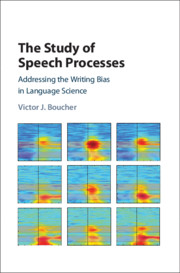Book contents
- The Study of Speech Processes
- The Study of Speech Processes
- Copyright page
- Contents
- Figures
- Tables
- Abbreviations
- Preface
- Introducing a Fundamental Problem of Language Science
- Part I Questions of Ontology: Writing and the Speech–Language Divide
- 1 How We Are Introduced to the Study of Spoken Language
- 2 The Modality-Independence Argument and Storylines of the Origin of Symbolic Language
- 3 The Recent History of Attempts to Ground Orthographic Concepts of Language Theory
- Part II Questions of Epistemology: The Role of Instrumental Observations
- Part III The Structure of Speech Acts
- Part IV The Processing of Speech Meaning
- References
- Index
2 - The Modality-Independence Argument and Storylines of the Origin of Symbolic Language
from Part I - Questions of Ontology: Writing and the Speech–Language Divide
Published online by Cambridge University Press: 14 January 2021
- The Study of Speech Processes
- The Study of Speech Processes
- Copyright page
- Contents
- Figures
- Tables
- Abbreviations
- Preface
- Introducing a Fundamental Problem of Language Science
- Part I Questions of Ontology: Writing and the Speech–Language Divide
- 1 How We Are Introduced to the Study of Spoken Language
- 2 The Modality-Independence Argument and Storylines of the Origin of Symbolic Language
- 3 The Recent History of Attempts to Ground Orthographic Concepts of Language Theory
- Part II Questions of Epistemology: The Role of Instrumental Observations
- Part III The Structure of Speech Acts
- Part IV The Processing of Speech Meaning
- References
- Index
Summary
Saussure argued that the arbitrariness of symbolic signs shows that language draws from a mental capacity separate from speech since, as he believed, symbols appear in other modalities as in writing and sign languages. This mentalist concept had a broad impact which reflects in current hypotheses of the origin of symbolic language. A review of research shows that, contrary to a mentalist concept, non-human primates have the mental resources serving to learn, use, and combine given symbolic signs, but do not develop symbols in the wild. On the other hand, comparative physiology reveals a human-specific ability to control intonation and oral modulations, and evidence shows that this ability links to the development of inherently symbolic signs in speech, contrary to gestural sign languages which develop from non-arbitrary iconic signs.
Keywords
- Type
- Chapter
- Information
- The Study of Speech ProcessesAddressing the Writing Bias in Language Science, pp. 34 - 51Publisher: Cambridge University PressPrint publication year: 2021

